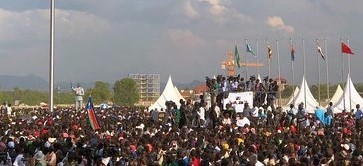Analysts say the bloated state governments, economic crisis, and insecurity in parts of the country present major obstacles for the newly formed state governments' to deliver services during the transitional period.
Citizens across the country especially those in war-ravaged areas, flood-affected areas, and areas experiencing communal violence have been patiently waiting for the state's governments to provide basic services and security.
Last month, President Salva Kiir announced the formation of the ten states' governments by appointing advisors, ministers, governors, and heads of state commissions. The government is yet to reconstitute the national assembly and graduate and deploy unified forces.
Speaking to Radio Tamazuj, journalist and political analyst Atem Simon Mabior said the delay in forming the states' governments created frustration amongst the civil population but rewarded politicians.
"The interest of the parties was to increase the number of ministries and members of state parliaments, to silence dissenting voices by creating opportunities for them in the states and counties. And this is not the main concern for the citizens of South Sudan," he said.
He added, "The citizens of South Sudan are concerned with the implementation of the security arrangements, the deployment of forces, the withdrawal of military forces from civilian areas, the return of displaced persons and refugees to their homes, the resolution of the causes of displacement, the provision of basic protection and the return of houses to their owners in Wau, Juba, Malakal, and other cities."
“The majority of officials will for the first time assume constitutional posts in the states, and their main focus will be on how to empower themselves and divide the budget. Remember the government has not been able to pay civil servants, where will they get the money for a bloated government?" Atem wondered.
He pointed out that the lack of public excitement over the appointments can be understood as citizens' uncertainty over service delivery.
"The parties do not talk about the agreement, as if the division of power is the end of the agreement. Many parties in the government and the opposition believe that the essence of the agreement is for them to obtain positions," he added.
Economic challenges
Economist John David said the transitional government should have been lean due to the country's economic crisis.
He said, "In a country complaining about a financial crisis due to Corona, the decline in oil prices, and the absence of funds to implement the peace agreement, it was better to reduce the size of governments."
David said the newly formed governments are only meant to share power at the expense of depleting national resources.
With the continued security instability in parts of the country, David says the government will find it difficult to embark on agriculture and other non-oil revenues to supplement its budget.
"Because of the Coronavirus situation facing the world, the global decline in oil prices in an oil-dependent country, and the instability, the transitional government cannot benefit from non-oil revenues. Not forgetting that currently international organizations and donor countries feel that their financial contributions are not well spent," he added.
Last month the parties to the Revitalised Government of National Unity in February 2020 attributed the slow implementation of the deal's provisions to the financial crisis biting the country, a lack of political will, and the global Coronavirus pandemic.




